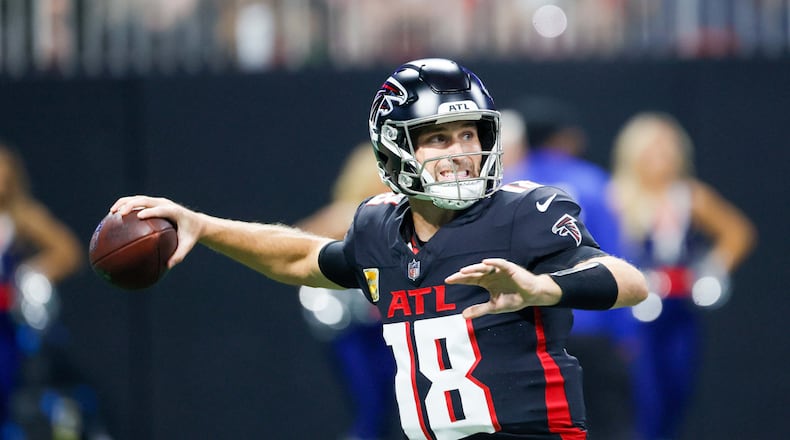In hindsight, maybe Kirk Cousins recognized what his teammates and coaches were seeing on the Falcons practice fields in Flowery Branch and what the team’s fans saw in the final three games of the season.
Improving week by week, Michael Penix Jr. was the real deal.
It would help answer one of the more perplexing riddles of the Falcons’ 2024 season, a journey of futility that extended the franchise’s postseason drought to seven consecutive years.
In an interview Tuesday on NFL Network, Cousins acknowledged that his right elbow and shoulder were injured in the Falcons’ 20-17 road loss to the New Orleans Saints Nov. 10. It flew in the face of repeated assurances during the season that he was healthy.
On Tuesday, Cousins said that in that Saints game, “I got hit pretty good in my right shoulder and elbow, and from there, kind of dealing with that. It was something that I was working through, and I just never really could get it to where I wanted it.”
It sounded a lot like Cousins effectively was acknowledging that he had fibbed when he said that his appearance on the injury report the following week was because of “a clerical error” and not the result of his actually being injured in the game, when he was sacked three times and the Saints registered nine quarterback hits.
Worth noting: The team didn’t publicly rebut Cousins’ explanation, but never backed it up, either. If it had been a clerical error — such mistakes sometimes happen — the Falcons would have corrected the mistake with a press release, particularly if their star quarterback had claimed an error had been made. They’ve been in trouble with the NFL previously with injury-report shenanigans; this would have been an odd situation to risk a fine.
So why would Cousins have attributed his appearance on the injury report as some sort of typo?
Perhaps because he recognized Penix as a legitimate threat to his starting job and didn’t want to give coach Raheem Morris any additional reason to give the first-round draft pick a shot. If Cousins had acknowledged that he was playing hurt as his play declined, it would have provided Morris all the reason and cover he needed to sub him out.
But if it had been a mere clerical error, as Cousins asserted, then his slump was merely that — a tough stretch that a veteran quarterback could be expected to get past. And that was the story that he and Morris told. It was only when Cousins’ career-worst performance left Morris little choice but to make a move that he did, four games after the loss to the Saints.
And then after Morris pulled Cousins, Penix put on a brilliant three-game display that rendered Cousins’ explanation moot. Completing 58 of 100 passes for 737 yards with three touchdowns against three interceptions, Penix made it clear that Cousins no longer was necessary as the Falcons’ starter going into the 2025 season. In those games, Falcons fans saw what the team’s defensive players had been experiencing on the practice field as Penix led the scout team.
“The arm strength and the talent is definitely there,” cornerback Mike Hughes told The Atlanta Journal-Constitution reporter D. Orlando Ledbetter before Penix’s first start. “He’s smart.”
Cousins surely saw it, too.
If that’s how it happened, it’s not difficult to understand Cousins’ motivations. This appeared to be a dream situation for him — a team with a playoff-worthy roster that had made a mammoth financial commitment to him and cast him as its franchise quarterback, the missing piece who could end the team’s playoff drought. At 36, he likely was not going to have a better opportunity to lead a team to his first Super Bowl. It even was in his wife’s hometown.
For an athlete who had overcome the odds throughout his career, even going back to high school, what a glorious final chapter it could have been. It makes sense why Cousins would have tried to protect that opportunity.
It leaves at least a few thoughts.
First, what would have happened had the Falcons protected Cousins better on that November Sunday at Caesars Superdome?
It’s likely that Cousins would have continued his strong play and led the Falcons to the playoffs. He would be going into the 2025 season as the firmly entrenched No. 1 quarterback ahead of the untested Penix.
What then?
Second, even if Cousins was insisting that he was healthy, Morris knew that his quarterback’s inclusion on the injury report was legitimate and had reason to conclude that his play wasn’t necessarily a mere slump.
Knowing that, should Morris have moved sooner on giving Penix a chance and potentially given his team a better chance to make the playoffs?
Third, maybe it was for the Falcons’ long-term best that Cousins did get hurt. While the injury ultimately torpedoed the season, it did ultimately open the door for Penix to demonstrate that he was ready for the No. 1 job.
While it leaves the Falcons with a huge salary-cap mess to clean up and it’s reasonable to question the ceiling of the Morris regime, it sure looks like they’re better off launching the Penix era sooner rather than later.
Whatever the answers, another failed season for the Falcons.
Call it a clerical error.
About the Author
Keep Reading
The Latest
Featured




